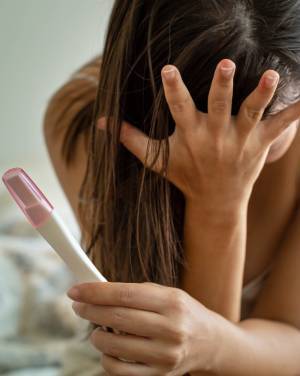My Period Is Late or Not Coming — What Could Be the Cause?
- A missed period is not necessarily a sign of pregnancy.
The menstrual cycle can be easily affected by external factors such as stress, some medications, hormonal contraceptives or even specific illnesses. - Even women whose monthly cycle is usually on time can have a missed or late period. This is not usually a cause for concern, as the cycle will gradually resume its regularity.
- Taking a pregnancy test can help you discern whether your period is late because of pregnancy. If you are concerned or experiencing additional symptoms, consult your doctor.
Instant Answer: Your period is late, and you're wondering whether you could be pregnant? Take our Online Pregnancy Test for an initial assessment!
Do you have any questions or concerns? Write your message directly here ⬇️
My Period Hasn't Come Yet — What's Going On?
The absence of menstruation is called amenorrhoea.
There can be various reasons for your period to be overdue.
It is common to initially suspect a pregnancy since a missed period is often one of the first signs of pregnancy.
Maybe you feel pleased about the possibility of being pregnant, or perhaps you are anxious because you weren't planning on it. Many women are apprehensive every time their period is late, regardless of whether their cycle is regular or not.
👆By the way, period tracker apps usually calculate when to expect the next period by using algorithms. Some assume a 28-day cycle, even though this is not true for many women. Or they calculate an average value based on your previous data.
However, our bodies do not function according to computerised numbers but follow their own set 'periods' month after month. Therefore, the app calculations can often be inaccurate, causing many women to feel worried. Essentially, apps can only be used as a rough prognosis but not as an exact prediction of when the next period is due.
Here are the most common causes:
Possible Causes for a Skipped Period
Lifestyle
Whether you are gearing up for major exams at school or university, are racing against a deadline at work, or dealing with a challenging situation in your private life: tension, time pressure and emotional upheaval have an impact on one’s body and can cause periods to be delayed.
A changed sleep-wake cycle (e.g. due to the time change during a long-distance trip), excessive exercise, dieting and being under or overweight can also throw one’s menstrual cycle out of sync.
Typically, your cycle will eventually return to a regular rhythm when your situation is altered.
Ultimately, the female body is designed to nurture and sustain new life. If your body is not strong enough, this may affect your fertility and menstrual cycle. In this respect, it is a natural safeguard. This may also be a way of your body telling you to take greater care of yourself. For example, dietary changes may have led to nutrient deficiencies. A lack of certain nutrients (such as magnesium) can affect your cycle.
If you are not pregnant and your cycle does not return to its usual pattern, ask for a medical check-up.
Some women have irregular cycles throughout their lives. A doctor’s visit may also shed some light on the cause.
Hormonal Birth Control
Hormonal contraceptives such as the birth control pill or NuvaRing® affect one's hormonal balance and menstruation. The bleeding associated with this form of birth control is known as withdrawal bleeding. Its presence or absence is not necessarily indicative of one’s pregnancy status.
Using oral contraceptives often leads to disruptions of the menstrual cycle and irregular cycles, especially when starting, discontinuing or switching to a different medication. Women commonly experience that it takes some time to re-establish a regular menstrual cycle after stopping the pill.
Taking the morning-after pill may also delay the onset of menstruation, as the active ingredients aim to alter the natural hormone levels.
- For more information, go to When to Take the Morning-After Pill.
Top Picks for Your Situation:
Medication or Medical Procedures
The active ingredients of some medications can affect a woman's hormone levels and, thereby, her menstrual cycle. These include antidepressants, corticosteroids and some cancer and blood pressure medications. Taking these drugs can cause irregular or missed periods.
Undergoing extensive medical treatments, such as an operation or chemotherapy, can also lead to abnormal cycles and an absence of menstrual periods.
For information on a specific medication, check the package insert or ask your prescribing physician. Your doctor can advise you, especially regarding more potent medication or longer treatments.
Tip: Are you on medication and have just discovered that you are pregnant? Are you wondering whether these medications could be harmful during pregnancy? Our Tox Test will provide an initial assessment and more detailed information!
Natural Causes
Common natural causes for missing a period are pregnancy or breastfeeding.
Age also plays a role: Young women often have irregular menstrual cycles as it takes a while to establish a regular rhythm. A missed period in women over 40 may indicate the onset of menopause. During perimenopause, periods can come at irregular intervals.
- Pregnant during menopause? Click here for more information.
- Could I get pregnant while breastfeeding? Read more here.
- How soon can you get pregnant after giving birth? Find out here.
Illnesses
In addition to natural conditions or lifestyle, some health conditions can also lead to disruptions in the menstrual cycle.
These include polycystic ovary syndrome (PCOS), endometriosis or thyroid disorders.
The main symptom of PCOS is the absence of ovulation and, as a result, the lack of periods due to cysts forming on the ovaries. Endometriosis is particularly symptomatic, causing severe abdominal pain during period bleeding. This is due to the growth of the uterine lining outside the uterus. If this tissue adheres to the ovary, it could interfere with egg maturation and ovulation, leading to an irregular cycle.
An overactive or underactive thyroid can lead to a hormonal imbalance, causing irregular or prolonged cycles.
Ask your doctor if you are concerned that you may have one of these chronic health conditions. These are detectable by ultrasound or blood tests. A treatment plan would then be made according to the findings.
Negative Pregnancy Test but No Period?
In this case, it is possible that you are indeed pregnant but may have taken the test too soon. It may have been too early to show a positive result.
If you have cause to believe you might be pregnant, try taking another test.
For more information, go to:
- How Soon Can You Take a Pregnancy Test?
- How Does a Pregnancy Test Work?
- False-Negative Pregnancy Test → What Are the Chances?
Remember, there may also be another reason why your period has not come.
How Long Can You Go Without a Period and Not Be Pregnant?
Depending on the cause, your period may stop for a while — even if you are not pregnant. This can extend over several weeks or even months.
There are various reasons why your period may have been overdue for a long time. Perhaps one of the abovementioned causes may apply to you?
If you have not had a period for a long time, consult your doctor to discern whether this may be caused by a disease or whether your cycle has been disrupted for other reasons.
Am I Spotting and Not on My Period?
Was your bleeding very light, or perhaps you were only spotting? You are probably wondering what this could mean. Spotting and intermenstrual bleeding (aka breakthrough bleeding) can happen due to various hormonal changes. This kind of bleeding is not the same as a period. It is also possible that you are on your period, which is very light. Some women generally have relatively light periods. If you are concerned or if this is unusual for you, speak to your gynaecologist to rule out any physical causes, such as iron deficiency.
However, very light bleeding can also mean that, rather than being on your period, you are experiencing implantation bleeding. This would indicate a pregnancy.
For more information, go to Period While Pregnant.
No Period — More Questions or Concerns?
Do you have further questions or concerns about your situation that have not yet been addressed?
Perhaps one of the following tests will help you gain clarity:
- 🤔 Could my symptoms be early signs of pregnancy?
- 🧑⚕️ (Suspecting a) pregnancy – How soon to see a doctor?
- ⛑ First Aid Test for unintended pregnancies



















